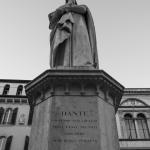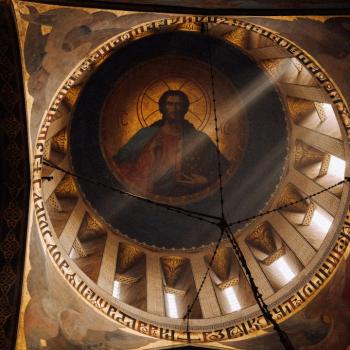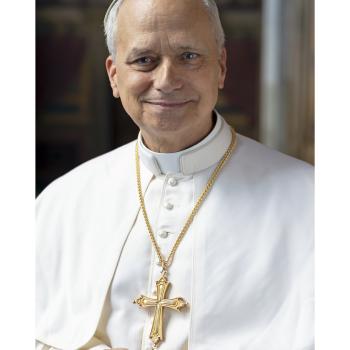In the year 1963, it is safe to say most people felt a general anxiety about the future of humanity. With the looming threat of nuclear war, people all over the globe sought reasons to continue to hope for peace, even though the obstacles seemed insurmountable. So many people today are unable to find peace because fear overwhelms them. They are afraid of losing their job, or of getting sick, or of political upheaval. Fear is a powerful emotion and rulers of all kinds in this world often use it to keep people in line. Since Jesus did not come seeking power, he is happy to give people peace. For Jesus, peace and mercy connect on a deep level.
God’s Gift of Mercy
On Divine Mercy Sunday, it is customary to reflect on this great gift of God’s grace, that we might receive mercy. After the Second World War, the Western world had a palpable fear of once again getting into a similarly violent and desperate situation. This led to many peace initiatives with the hope that they could stave off such grave international conflict. We see during this time the rise of the United Nations and the Peace Corps in the United States. Pope John XXIII took a different tactic and wrote an important encyclical outlining the Church’s hope for peace, Pacem in Terris.
The very order of things, therefore, demands that during this sacred season we pray earnestly to Him who by His bitter passion and death washed away men’s sins, which are the fountainhead of discord, misery and inequality; to Him who shed His blood to reconcile the human race to the heavenly Father, and bestowed the gifts of peace.
“For He is our peace, who hath made both one … And coming, He preached peace to you that were afar off; and peace to them that were nigh” (Pope John XXIII, Pacem in Terris, 169).
This saintly man, “the good Pope,” knew that peace would not come through merely human means. While many placed their hopes in Marxist ideologies and countercultural communes, Pope John XXIII reminded people that Jesus Christ is the only lasting source of peace. Where does this peace come from? The healing of division is a fruit of authentic peace. We do not need merely the healing of external divisions but even more the healing of internal division. I am always fascinated how in the mass we exchange a sign of peace. This means that we are praying for those around us to experience peace.
Peace Is Not The Mere Absence Of Conflict
This peace comes from an integration of what is going on inside of us. Peace is not merely the absence of war or external conflict. To achieve true peace, we need to be at peace with ourselves, which means healing that internal division. Along these lines, some words from Solzhenitsyn have always fascinated me.
The line separating good and evil passes not through states, nor between classes, nor between political parties either — but right through every human heart — and through all human hearts. This line shifts. Inside us, it oscillates with the years. And even within hearts overwhelmed by evil, one small bridgehead of good is retained (Aleksandr Solzhenitsyn, The Gulag Archipelago 1918-1956).
Peace is Ruined by Sin
Sin ruins peace. I see it so often in the confessional. We can talk about how natural disasters and illness cause pain, but I see so much more suffering caused by sin and by the misuse of free will. If we are going to have peace, we need to recover a sense of God’s mercy. When Christ enters the Upper Room, he does not begin by speaking about mercy. When he came through the walls of the Upper Room, he encouraged them right away. He knew that what they truly needed was peace.

Jesus said to them again, “Peace be with you. As the Father has sent me, so I send you.” (Jn. 20:21)
He greets them with the typical Aramaic “shalom,” meaning “peace.” Christ has come to bring peace through his gift of mercy that comes through the cross. We will not be saved by holding on to an ideology or accepting a series of beliefs, but by clinging tightly to Christ himself.
Pope John XXIII
At the height of the Cold War, Pope John XXIII did not get mixed up in politics, but rather invited people to turn their gaze on the Risen Lord. It is easy for us to feel anguish because of the depravity that can be found in the world. Nevertheless, we always have the opportunity to renew our faith in Jesus Christ and trust completely in him. As President John F. Kennedy and Soviet Premier Nikita Kruschev tried to employ opposing tactics to ensure military superiority and lend confidence to their own peoples, John XIII made a universal appeal to peace based on mutual respect and, above all, trust in God.
In a world where the powerful try to write history along lines of political division, it is refreshing to turn to the pages of the Gospel and see the power of Jesus who brought peace to the apostles while they were still cowering in fear after the Crucifixion. They had heard the rumors of his resurrection as early as Sunday morning, but their hearts were still overcome with fear and worry before he arrived in their presence.
Words of Peace
Jesus knew the anguish they had suffered for the last several days, thinking that he was dead and that all they had done together was lost. He could have talked about a million things but the most important and first one was to reassure them in their faith and hope.
Peace will not come definitively through political solutions, but rather from coming to believe truly in the power of Christ’s resurrection and sharing this good news. We should become ambassadors of Christ’s peace and of his mercy in the world. Where the world sees a Christian, it should see someone who is ready to proclaim God’s message of peace and of mercy.
Subscribe to the newsletter to never miss an article.














